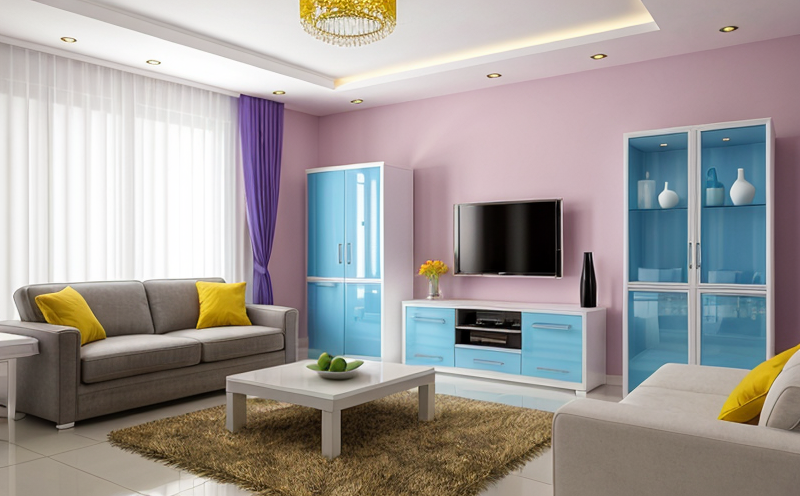UNE EN 12720 Resistance to Cold Liquids Testing of Decorative Plastics
The UNE EN 12720 standard specifies a method for determining the resistance to cold liquids (such as water or other non-aggressive solutions) of decorative plastics used in home decoration. This testing is crucial for ensuring that materials meet safety and performance standards, particularly when they are exposed to environmental conditions that can lead to degradation over time.
Home decoration plastics often come into contact with various household chemicals and liquids during normal use. These materials include flooring, wall panels, trim, and other decorative elements used in interior design. The UNE EN 12720 test evaluates the durability of these plastics by exposing them to cold water for a specified duration under controlled conditions.
Compliance with this standard ensures that products not only meet aesthetic expectations but also maintain their integrity and safety over time. This is especially important in environments where frequent cleaning or exposure to moisture may occur, such as kitchens, bathrooms, and living rooms.
The test procedure involves preparing the specimens according to the specified dimensions and tolerances outlined in the standard. Specimens are then immersed in a cold water bath for a predetermined period, typically 72 hours. After the immersion, the specimens are examined for any visible changes such as discoloration, cracking, or loss of adhesion.
The UNE EN 12720 test is an essential component of quality assurance and product development processes in the home decoration industry. By adhering to this standard, manufacturers can ensure that their products will withstand the rigors of everyday use without compromising safety or appearance.
Compliance with this standard also enhances marketability by assuring customers of the durability and reliability of the decorative plastics used in their homes. This is particularly important for companies operating within the European Union, where adherence to harmonized standards like UNE EN 12720 is mandatory for certain products.
For R&D engineers and quality managers, understanding the nuances of this test can be invaluable. It provides a clear framework for evaluating new materials and formulations, ensuring that they meet or exceed industry expectations. Compliance officers will find this standard particularly useful in maintaining regulatory compliance and avoiding potential legal issues associated with product failures.
In summary, the UNE EN 12720 test is a critical tool for ensuring the quality and safety of home decoration plastics. By adhering to this standard, manufacturers can build trust with consumers and ensure that their products meet both functional and regulatory requirements.
Scope and Methodology
The scope of UNE EN 12720 is focused on determining the resistance to cold liquids (such as water or other non-aggressive solutions) of decorative plastics used in home decoration. This standard applies to a wide range of plastic materials that are typically exposed to environmental conditions and household chemicals.
- Specimens for testing must comply with the dimensional tolerances specified in the standard.
- The test involves immersing the specimens in cold water (0°C ± 1°C) for 72 hours.
- After immersion, the specimens are examined for any visible changes such as discoloration, cracking, or loss of adhesion.
The methodology is designed to simulate real-world conditions where decorative plastics may be exposed to cold water or other non-aggressive solutions. This ensures that the tested materials can withstand typical environmental stressors without compromising their integrity or safety.
It’s important to note that this test does not evaluate resistance to aggressive chemicals like acids, alkalis, or solvents. Instead, it focuses on the behavior of decorative plastics under conditions where they are likely to be exposed to water during normal use.
Industry Applications
The UNE EN 12720 test is particularly relevant for manufacturers and suppliers in the home decoration sector. It applies directly to a variety of decorative plastics used in flooring, wall panels, trim, and other interior design elements.
- Flooring Materials: Decorative plastics are often used as tiles or sheets for kitchen floors, bathroom floors, and living room floors where they are exposed to water during cleaning.
- Wall Panels: Wall panels made from decorative plastics can be found in bathrooms and kitchens, where they may come into contact with water during routine cleaning.
- Trim and Trim Profiles: Decorative trims and profiles used around windows, doors, and other architectural elements are often exposed to moisture during installation or use.
In addition to these applications, the test is also relevant for manufacturers of decorative plastics used in outdoor furniture, such as benches or chairs. While not directly related to home decoration, these products may still come into contact with cold water and other non-aggressive solutions when exposed to environmental conditions.
The UNE EN 12720 test ensures that these materials can withstand the rigors of everyday use without compromising their integrity or safety. This is particularly important for companies operating within the European Union, where adherence to harmonized standards like UNE EN 12720 is mandatory for certain products.
International Acceptance and Recognition
The UNE EN 12720 standard has gained widespread acceptance and recognition across Europe. It is particularly relevant in countries that are members of the European Union, where harmonized standards like this one are mandatory for certain products.
- European Union: Compliance with UNE EN 12720 is required for decorative plastics used in home decoration within the EU. This ensures consistency across member states and facilitates trade between them.
- Beyond Europe: While not mandatory outside of the European Union, many manufacturers and suppliers choose to comply with this standard to ensure that their products meet global quality standards and can be marketed internationally.
The acceptance of UNE EN 12720 is further enhanced by its alignment with other international standards such as ISO 9001 for quality management systems. This ensures that the testing process is not only consistent but also meets high-quality standards across different regions and industries.
For manufacturers and suppliers, compliance with this standard can enhance their reputation and marketability. It demonstrates a commitment to quality and safety, which is particularly important in highly competitive markets.





